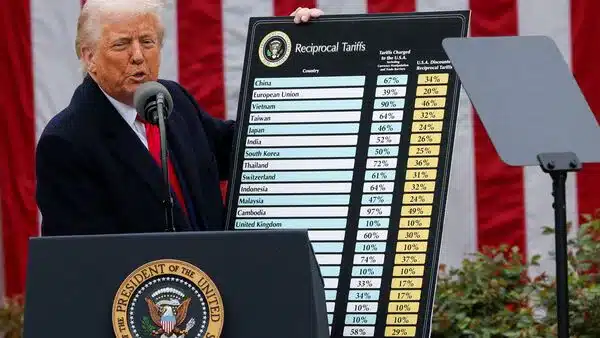Trump Urges Global Markets to Open for US Beef

In a bold move to boost American agriculture, President Donald Trump is calling on countries to lift longstanding restrictions on imports of US beef and poultry. During an announcement on April 2, he criticized nations like Australia, the UK, and the EU for their “non-science-based” bans, which he argues hinder American farmers. These restrictions have been in place for decades, primarily due to food safety concerns, and Trump is using them as leverage to impose new trade tariffs.
Understanding the Import Restrictions
Countries such as Australia, Argentina, the UK, and the EU have imposed bans on certain US beef products for various reasons. The roots of these restrictions can be traced back to 2003 when bovine spongiform encephalopathy (BSE), commonly known as Mad Cow Disease, was detected in US cattle. This disease poses significant health risks to humans, leading to the deaths of 233 individuals worldwide from Creutzfeldt-Jakob disease, which is linked to consuming infected meat.
While US health authorities have made strides in controlling BSE, restrictions remain. Australia lifted its ban on US beef exports in 2019, but US imports are still limited by strict biosecurity laws. Robyn Alders, a veterinary scientist at the Australian National University, noted that US cattle farmers must demonstrate that their cattle are entirely bred, raised, and slaughtered in the US to meet these regulations. Currently, very few companies are willing to undertake the necessary tracing to make this feasible.
Argentina has also relaxed its BSE ban on American beef products since 2018 but continues to restrict live cattle imports until a new sanitary certificate is finalized between the two nations.
Hormonal Concerns in the EU and UK
The European Union and the UK have maintained bans on US beef imports since 1989 due to the use of growth hormones in cattle farming. These hormones, such as estradiol 17ß and testosterone, are commonly used in the US to enhance growth and feed efficiency. However, European authorities have conducted their own scientific evaluations, concluding that the daily intake of these hormones could pose health risks, including potential cancerous effects.
While the EU does import non-hormone-treated beef from the US, the overall sentiment remains against hormone-treated products. Erik Millstone, a food and science policy expert at the University of Sussex, emphasized that the EU’s comprehensive risk assessments consider the entire population, including vulnerable groups like children and the elderly. In contrast, US authorities have argued that their food safety testing shows no risk to healthy adults.
Chlorinated Chicken and Food Safety Standards
Another contentious issue is the EU’s ban on US poultry that has been treated with chlorine. US poultry farmers often wash their products in chlorine solutions to eliminate harmful bacteria, such as campylobacter, which can lead to food poisoning. However, the European Food Safety Authority (EFSA) has raised concerns that this practice may allow for lower hygiene standards during earlier stages of production.
Research has suggested that chlorine rinsing may not effectively decontaminate poultry, leading to higher rates of bacterial food poisoning in the US compared to the EU and UK. Millstone pointed out that the EU’s stringent regulations on animal welfare and food safety are designed to ensure high standards throughout the entire food production process.
Path Forward for US Producers
For US producers to gain access to these lucrative markets, they must adapt their farming practices to meet international food safety standards. While Australia and Argentina are open to importing US beef, compliance with their regulatory frameworks is essential. In contrast, the UK and EU present a more challenging landscape. US producers would need to cease the use of growth hormones in beef production and eliminate chlorine washing in poultry.
Public sentiment in Europe also poses a significant hurdle. A 2020 poll indicated that 80% of the British public opposes the import of chlorinated chicken, reflecting widespread skepticism about US food safety practices. As the Trump administration pushes for expanded access to international markets, the path forward for US agriculture remains complex and fraught with regulatory challenges.
Observer Voice is the one stop site for National, International news, Sports, Editor’s Choice, Art/culture contents, Quotes and much more. We also cover historical contents. Historical contents includes World History, Indian History, and what happened today. The website also covers Entertainment across the India and World.

